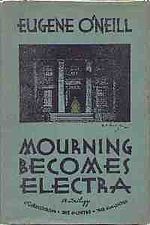- Mourning Becomes Electra
-
Mourning Becomes Electra 
1931 Liveright first edition coverWritten by Eugene O'Neill Date premiered 26 October 1931 Place premiered Guild Theatre
New York CityOriginal language English Genre Drama Setting 1865, New England IBDB profile IOBDB profile Mourning Becomes Electra is a play cycle written by American playwright Eugene O'Neill. The play premiered on Broadway at the Guild Theatre on 26 October 1931 where it ran for 150 performances before closing in March 1932. In May 1932, it was revived at the Alvin Theatre (now the Neil Simon Theatre),[1] and in 1972 at the Circle in the Square Theatre.[1]
Contents
Plot summary
- Main characters
- Captain Adam Brant
- Lavinia Mannon
- Christine Mannon
- Brigadier General Ezra Mannon
- Orin Mannon
- Captain Peter Niles
- Hazel Niles
- Amos Ames - A middle-aged carpenter, Amos and his wife Louisa form part of the chorus in Homecoming and The Haunted
- Louisa Ames - Louisa is the wife of Amos. She appears as part of the chorus of local people in Homecoming and has a taste for vicious gossip.
- Doctor Joseph Blake
- Jed
The story is an update of the Greek myth of Orestes to the family of a Northern general in the American Civil War. Agamemnon is now General Ezra Mannon, Clytemnestra is his second wife Christine, Orestes is his son Orin, and Electra is his daughter Lavinia. As an updated Greek tragedy, the play features murder, adultery, incestuous love and revenge, and even a group of townspeople who function as a kind of Greek chorus. Though fate alone guides characters' actions in Greek tragedies, O'Neill's characters have motivations grounded in 1930s-era psychological theory as well. The play can easily be read from a Freudian perspective, paying attention to various characters' Oedipus complexes and Electra complexes.
Mourning Becomes Electra is divided into three plays with themes corresponding to The Oresteia trilogy by Aeschylus. In order, the three plays are titled Homecoming, The Hunted, and The Haunted. However, these plays are normally not produced individually, but only as part of the larger trilogy. Each of these plays contain four to five acts, and so Mourning Becomes Electra is extraordinarily lengthy for a drama. In production, it is often cut down. Also, because of the large cast size, it is not performed as often as some of O'Neill's other major plays.
Adaptations
In 1947 the play was adapted for film by Dudley Nichols, starring Rosalind Russell, Michael Redgrave, Raymond Massey, Katina Paxinou, Leo Genn and Kirk Douglas. It was nominated for Academy Awards for Best Actor in a Leading Role (Michael Redgrave) and Best Actress in a Leading Role (Rosalind Russell). There was also a 1978 television miniseries production that aired on PBS and that starred Joan Hackett and Roberta Maxwell.
In 1967, the Metropolitan Opera gave the world premiere of an operatic version, composed by Marvin David Levy to the libretto of William Henry Butler. Both film and opera retain O'Neill's title.
Awards and nominations
- Awards
- 2004 Laurence Olivier Award for Best Revival
References
Further reading
- O'Neill, Eugene (1931). Mourning Becomes Electra: A Trilogy (First edition ed.). New York: Liveright. OCLC 7257106.
External links
- Mourning Becomes Electra at the Internet Broadway Database
- Mourning Becomes Electra at the Internet off-Broadway Database
Laurence Olivier Award for Best Revival (2001–2025) Twelfth Night / Uncle Vanya (2003) · Mourning Becomes Electra (2004) · Hamlet (2005) · Hedda Gabler (2006) · The Crucible (2007) · Saint Joan (2008)
Complete list · (1991–2000) · (2001–2025) Categories:- 1931 plays
- Broadway plays
- Plays by Eugene O'Neill
- Off-Broadway plays
- Laurence Olivier Award winning plays
- West End plays
Wikimedia Foundation. 2010.
